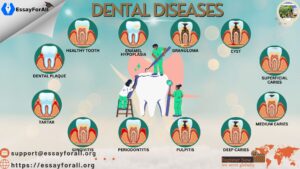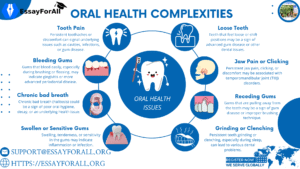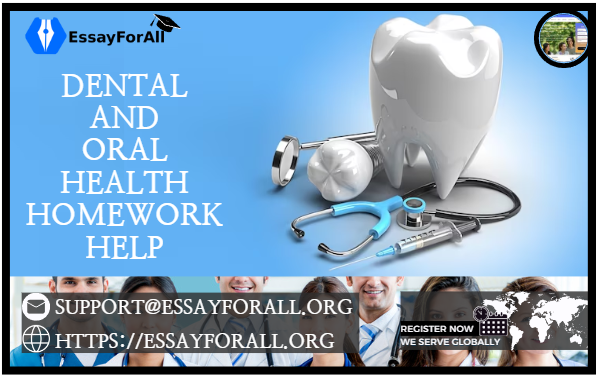Welcome to Essay For All, where students connect with supportive and reliable tutors for their nursing studies. If you are working on dental or oral health topics and feel the work is becoming heavy, confusing, or a little repetitive, you are not alone.
Many nursing students find this section demanding because it requires not just academic understanding, but also the ability to apply knowledge in real clinical situations. Our team provides personalized assistance to help you understand the material clearly and complete your assignments with confidence.
When discussing oral and dental health, many people think only of teeth brushing or cavities. However, the condition of the mouth influences more than just a person’s smile. A healthy mouth supports communication, nutrition, confidence, and general physical health. Neglecting the mouth for long periods may seem harmless at first, but it often leads to gum disease, tooth decay, infections, or even complications that affect the heart and other vital organs.
This section now expands on key dental and oral health concepts, disease processes, signs of poor oral hygiene, preventive care, and the nurse’s role in patient teaching. It is written to help students who need assignment support or simply wish to have clearer study material.
Oral Hygiene and Its Importance
Oral hygiene refers to keeping the mouth clean and free from disease. Most people achieve this through a routine of brushing, flossing, and occasionally visiting a dentist. However, oral hygiene is not just a matter of appearance. The mouth contains bacteria, and without proper care, these bacteria multiply quickly, forming plaque. Over time, this plaque can harden into tartar, which irritates the gums and causes inflammation.
When left untreated, this irritation may progress into more serious dental problems, affecting the gums, soft tissues, and even the bone supporting the teeth.
From a nursing point of view, oral health matters because:
- Nurses often identify early signs of dental problems during clinical assessments.
- Nurses play an important role in patient education.
- Oral health issues commonly affect vulnerable groups such as children, the elderly, and hospitalized patients.
Something as simple as providing oral care for a bedridden patient may help prevent infections such as pneumonia. That makes oral care a meaningful component of quality nursing practice.
Common Dental and Oral Diseases
1. Oral Cancer
Oral cancer may affect the lips, tongue, gums, cheeks, throat, or the floor of the mouth. It often begins as a small sore that does not heal. Early detection is important because treatment is more successful during early stages.
Risk factors include:
- Smoking and tobacco chewing
- Excessive alcohol use
- Chronic irritation inside the mouth
- Certain viral infections (such as HPV)
Nurses who work in primary care, outpatient clinics, or cancer wards may find themselves involved in early screening, patient education, and supportive care.
2. Gingivitis (Gum Disease)
Gingivitis is a condition marked by inflammation of the gums. It is often linked to plaque build-up caused by ineffective brushing or flossing. Patients may notice:
- Swollen or red gums
- Bleeding during brushing
- Bad breath
If not treated, gingivitis can progress to periodontitis, which damages the structures supporting the teeth. At this point, the teeth may loosen or fall out.
3. Dental Cavities
Cavities form when bacteria in the mouth feed on leftover food particles, producing acids that gradually wear away the tooth enamel. The longer plaque remains on the tooth surface, the more damage occurs.
Children are particularly vulnerable due to high consumption of sweets, poor brushing habits, or lack of supervision in oral care. Nurses working in pediatric units or community clinics often participate in school dental health awareness programs.

Signs of Poor Oral Hygiene
A person’s mouth will often show early warning signs when something is wrong. These signs should not be ignored:
| Sign | Possible Meaning |
|---|---|
| Bleeding or swollen gums | Early gum disease |
| Tooth pain or sensitivity | Possible decay or enamel wear |
| Bad breath that does not go away | Bacterial infection or dental decay |
| Mouth sores lasting more than 2 weeks | Possible early oral cancer |
| Receding gums | Gum disease or aggressive brushing |
| White or yellow coating on tongue | Poor cleaning or bacterial growth |
In a clinical setting, nurses are expected to recognize these signs when conducting general examinations.
Systemic Health Problems Linked to Poor Oral Hygiene
One of the more interesting aspects of oral health is how it relates to other body systems. The bacteria in the mouth do not always remain there. They may enter the bloodstream and trigger inflammatory reactions in other organs.
Examples include:
- Heart disease: Inflammation caused by gum disease may contribute to narrowing of arteries.
- Diabetes complications: Poor oral health may make blood sugar control more difficult, and diabetes may also worsen gum disease.
- Pneumonia: Bacteria from the mouth may be inhaled into the lungs, especially in bedridden or elderly patients.
- Pregnancy issues: Gum disease is associated with premature birth and low birth weight.
This connection explains why dental care is not just cosmetic—it is important for overall health.
The Nurse’s Role in Promoting Good Oral Health
Nurses interact with patients more frequently than dentists in many settings. This means nurses are in a strong position to support oral health.
Some key nursing responsibilities include:
- Assessment: Observing the condition of the teeth, gums, tongue, and breath during routine checks.
- Teaching: Showing patients how to brush correctly, explaining the value of flossing, and discussing diet choices.
- Supporting dependent patients: Providing oral care to patients who cannot care for themselves, including those in ICU, long-term care, or post-surgery recovery.
- Encouraging dental visits: Helping patients schedule or understand the importance of regular checkups.
Even something as simple as reminding a recovering patient to maintain hydration can improve saliva flow and reduce bacterial growth.

Case Example for Nursing Application
Consider a 46-year-old patient who visits a clinic with complaints of bleeding gums and persistent bad breath. He works long hours and often eats snacks late at night without brushing. The nurse notices plaque build-up and mild swelling of the gums.
Nursing approach may include:
- Discussing current oral hygiene habits without judgment.
- Demonstrating proper brushing technique using a soft-bristled brush.
- Advising the patient to limit sugary snacks and rinse the mouth after meals.
- Encouraging a dental appointment for cleaning and further assessment.
- Scheduling a follow-up visit to check progress.
The goal is not only treatment, but long-term habit change.
Simple Ways to Improve Oral Hygiene
- Brush teeth at least twice a day using fluoride toothpaste.
- Floss daily to remove plaque between teeth.
- Clean the tongue to prevent bacterial build-up.
- Use antibacterial mouthwash if recommended.
- Drink enough water to maintain moisture in the mouth.
- Avoid tobacco use, as it damages gums and increases cancer risk.
- Visit a dentist for routine cleaning, even when there is no discomfort.
Foods that Support Good Oral Health
| Food Type | Benefit |
|---|---|
| Dairy (cheese, milk, yogurt) | Replenishes minerals in tooth enamel |
| Vegetables high in fiber | Helps keep the mouth clean and stimulates saliva |
| Fluoride-containing foods and water | Strengthens enamel and prevents decay |
| Crunchy fruits like apples | Lightly scrub the teeth and stimulate gum circulation |
Diet plays a major role in oral health, especially for children and individuals with chronic illnesses.
Why Students Choose Essay For All for Nursing Assignment Help
- Tutors have background experience in nursing and oral health instruction.
- We explain topics clearly and practically.
- All work is original and written from scratch.
- Support is available at any time.
- Pricing is reasonable for students.
The aim is to help you understand the subject rather than simply completing tasks for you. When you understand the content, exam preparation and practical assessments become easier.
Remember, Oral and dental health nursing involves more than knowing the names of diseases or how to brush teeth. It requires awareness of how oral health affects the whole body, how lifestyle contributes to disease, and the nurse’s part in guiding patients toward better habits. With the right support and study approach, students can learn these concepts with clarity and apply them effectively in real care settings.
If you need clarification on specific assignment questions, case studies, or project writing, our team at Essay For All is always ready to assist.
